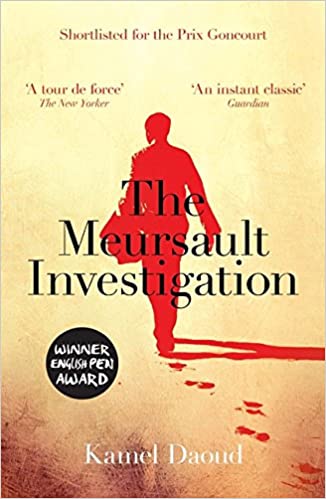
The Meursault Investigation
Algiers, Summer 1942: on a lonely beach shimmering with heat, a certain Meursault shoots someone. He isn’t quite sure why he did so – and yet he becomes world-famous, as Meursault is the existentialist hero in Albert Camus’ The Stranger. By contrast, the man who he kills is less famous, in fact completely forgotten from history: not even once will his name be uttered. Yet, this is not because he is unknown, rather, because he doesn’t count. His name, his story, his identity is simply of no interest to the white readership because the murdered man is an Arab. He is one of the ghosts that this country accumulated while the colonial masters robbed it. This is because the Algerians, although they make up nine-tenths of the population, are politically invisible and remain only a hazy Other for both the French colonists and the Europeans.
Now, the brother of the murdered man writes, or rather, monologues, against this in Kamel Daoud’s Writing Back, in the novel The Meursault Investigation. In doing this he mirrors the narrative form of The Stranger, and the mirroring can be traced beyond this example. Throughout the course of the novel it becomes clear that the protagonist mutates more and more into the revenant of his older, killed brother and finally, he even takes up a weapon himself in order to kill a Frenchman in a murder that he constitutes as simply ‘restitution’. This occurs in exactly mirrored conditions: it is dark and cold rather than light and hot, it is 2am rather than 2pm, and the moon is the sole witness, rather than the sun.
This ‘restitution’ in Daoud’s novel is an allusion to another text which also deals with colonial conditions in Algeria: Franz Fanon’s The Wretched of the Earth. In the book, Fanon defends not only the rights of the colonised to engage in violence in order to free themselves from foreign domination, but above all, it also employs a writing style and an explicitness that reflects the lived and real violence experienced on an everyday basis in the colonies.
After all, colonial violence begins with language – this is how structural discrimination establishes itself, for example through legal texts that the affected can neither read nor understand. The eloquent traps of bureaucracy are menacing. Words become life-threatening, as the protagonist in The Meursault Investigation knows: “Have you noticed how he writes? He uses the art of poetry in order to describe the shot from a gun!” (11)
For me, this novel by Kamel Daoud has drawn a line under a sore spot that has bothered me for a long time: the mentioning and yet simultaneous concealment of Algerian life in The Stranger. Finally, something is set in Algeria, I thought, when we read Camus’ text for our French high school exam. Or that was my thought, until I noticed with disappointment that the Algeria I pictured, the Algeria that one part of my family comes from, was yet again not present. As always. It was only some time later that I could comprehend how this forgetting and leaving out of the Other is symptomatic. The Meursault Investigation proved to me, however, that it is in fact possible to write against this.
(English translation by John Cullen)
Order the book here and support us! The work behind poco.lit. is done by us – Anna und Lucy. If you’d like to order this book and want to support us at the same time, you can do so from here and we will get a small commission – but the price you pay will be unaffected.
